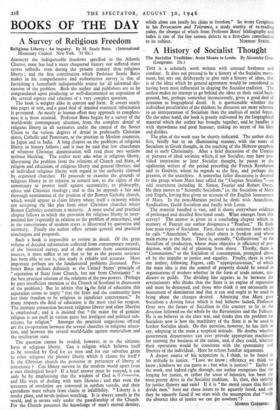BOOKS OF THE DAY
A Survey of Religious Freedom
AMONGST the indispensable freedoms specified in the Atlantic Charter, none has had a more chequered history nor suffered more severe setbacks even during the present century than religious liberty ; and the first contribution which Professor Searle Bates Makes in his comprehensive and authoritative survey is that of furnishing a henceforth indispensable source for all informed dis- cussion of the problem. Both the author and• publishers are to be congratulated upon producing so well-documented an exposition of the several aspects and relations of a very complex question.
The book is weighty alike in content and form. It covers nearly. 600 pages of text, and a good deal of detailed statistical information is presented. As nearly as human effort may approach to complete- ness it is there attained. Professor Bates begins by a survey of the World-wide contemporary situation, from the complete denial of religious liberty in all territories under the control of the Soviet Union to the various degrees of denial in professedly Christian states, Catholic and Protestant, to the position in Moslem countries, in japan and in India. A long chapter on the problems of religious liberty in history follows ; and it may be said that few churchmen of whatever Christian denomination will read these two sections Without blushing. The author next asks what is religious liberty, illustrating the problem from the relations of Church and State of religion and education, of religious liberty and general liberties, Lid Of individual religious liberty with regard to the authority claimed by organised churches. He proceeds to examine the grounds of religious liberty in its relation to natural law, to the rights of the community to protect itself against eccentricity, to philosophy, ethics and Christian theology ; and to this he appends a fair and thorough examination of the position of the Roman Catholic church, which would appear to claim liberty where itself a minority whilst not accepting the like plea from other Christian churches where Roman Catholics constitute a majority.. .A most useful and practical chapter follows in which the provision for religious liberty in inter- national law (especially in relation to the problem of minorities), and in the constitutions of modem states is illustrated by quotation and summary. Finally the author offers certain general and practical conclusions and proposals.
Such a book is impossible to review in detail. Of the great volume of detailed information collected from contemporary records, of the historical survey, and of the citations from constitutional sources, it must suffice to say that so- far as the present reviewer has been able to test it, this study is reliable and accurate. More important perhaps are the fundamental problems discussed. Pro- fessor Bates inclines definitely to the United States' principle of "separation of State from Church, but not from Christianity" as the best practical solution of the relations of the two powers. (Perhaps he pays insufficient attention to' the Church of, Scotland in discussion of the problem.) But he admits that itio the field of education this separation seems to imply "that the State and the community have lost their freedom to be religious in significant concreteness." In many respects the field of education is the most vital for religion. The intimate connection between religious liberty and other liberties is emphasised ; and it is insisted that "the major foe of genuine religion is not itself in variant guise but irreligion and political sub- stitutes for religion." Amongst the practical suggestions offered are the co-operation between the several churches in religious educa- tion, and between the several world-faiths against materialism and the totalitarian state.
The question cannot be evaded, however, as to the ultimate basis of religious liberty. Can a religion which believes itself to be revealed by God for us men and for our salvation grant to other religions the plenary liberty which it claims for itself.? Is the Christian church the protector or persecutor of liberty of conscience? Can liberty survive in the modern world apart from a sure theological basis? If a brief answer must be essayed, it can __ 0 VAO_OCL
only be by emphasising that the wisdom of God is n x x01,
and His ways of dealing with men likewise ; and that even the treasures of revelation are conveyed in earthen vessels, and their custodians must refrain from claims to infallibility. "Liberty is a tender plant, and netds jealous watching. It is always unsafe in the • world, and is secure only under the guardianship of the Church. For the Church possesses the knowledge of man's eternal destiny, which alone can justify his claim to freedom." So Wrote Creighton in his Persecution and Tolerance, a study worthy of re-reading today, the absence of which from Professor Bates' bibliography and index is one of the few serious defects in a first-class contribution


























 Previous page
Previous page